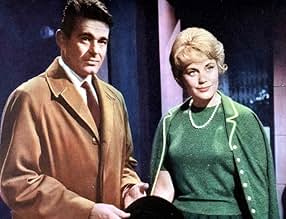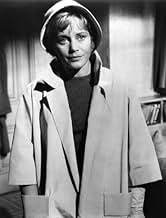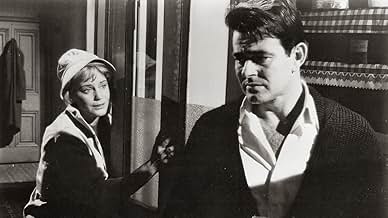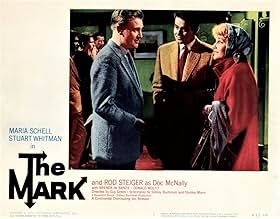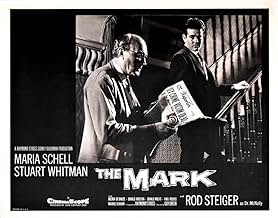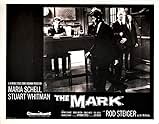VALUTAZIONE IMDb
7,2/10
1094
LA TUA VALUTAZIONE
Aggiungi una trama nella tua linguaA man who served prison time for intent to molest a child tries to build a new life with the help of a sympathetic psychiatrist.A man who served prison time for intent to molest a child tries to build a new life with the help of a sympathetic psychiatrist.A man who served prison time for intent to molest a child tries to build a new life with the help of a sympathetic psychiatrist.
- Regia
- Sceneggiatura
- Star
- Candidato a 1 Oscar
- 1 vittoria e 2 candidature totali
Anne Monaghan
- Mrs. Fontaine
- (as Anna Monaghan)
Recensioni in evidenza
Stuart Whitman, Rod Steiger, and Maria Schell star in "The Mark," a 1961 film from 20th Century Fox, filmed in England.
Whitman is Jim Fuller, who has been released from prison after being convicted of intent to molest a child. His psychiatrist, Dr. McNally, believes him to be cured and continues to see him in an attempt to help him get back into society and have some sort of a life.
The above is what makes the film seem dated, but in the case of the Whitman character, maybe not. Today we believe that this tendency is incurable or nearly incurable. In the case of Jim Fuller, a troubled man, he took a girl for a ride in a car, but backed out of doing anything. He brought the girl home. Seen in that light, it's possible this incident came out of something in his past (as we're told in flashbacks) and wasn't the result of some sort of perversion and therefore could be eradicated.
Jim has a job from a sympathetic employer and proves himself excellent at it. He rents a room from an older couple. And he meets a woman in his office, Ruth (Maria Schell) whom he tentatively starts to date. They fall in love, and he is introduced to her young daughter, Janie (Amanda Black), who is crazy about him.
When a young woman is kidnapped, Jim is brought in by the police but he has an alibi. Unfortunately a reporter who knows who he is starts stalking him. When he sees Jim at an amusement park with Janie acting completely above board, he writes a lurid story.
This is a well-done film with a sympathetic performance by Whitman, who received an Oscar nomination. He does a beautiful job as a sad, insecure, sometimes angry man who doesn't quite have the confidence in himself that his doctor has, but wants to believe he's okay. Rod Steiger is simply great, low-key (unlike The Big Knife where he chewed any scenery available) -- a perfect psychiatrist, patient, friendly, supportive.
Maria Schell was supposed to be a star in the U.S., but it didn't happen. A friend of mine recalls the night that Schell and Audrey Hepburn were given a party to introduce them to Hollywood. Norma Shearer, retired for over ten years by then, came with her ski instructor husband. She took off her gown's evening jacket and danced the night away. Audrey and Maria sat up against the wall all night.
At any rate, Schell is lovely here. Ruth, too, is afraid of love after being widowed. She falls for Jim knowing he was in prison -- but not why -- and trusts him with Janie. Can she stick with him once the story is published? Some trivia: Whitman lost the Oscar to Schell's brother Maximillian for his marvelous performance in Judgment at Nuremburg.
Excellent film. You're really pulling for Jim all the way through. A lost film well worth seeing.
Whitman is Jim Fuller, who has been released from prison after being convicted of intent to molest a child. His psychiatrist, Dr. McNally, believes him to be cured and continues to see him in an attempt to help him get back into society and have some sort of a life.
The above is what makes the film seem dated, but in the case of the Whitman character, maybe not. Today we believe that this tendency is incurable or nearly incurable. In the case of Jim Fuller, a troubled man, he took a girl for a ride in a car, but backed out of doing anything. He brought the girl home. Seen in that light, it's possible this incident came out of something in his past (as we're told in flashbacks) and wasn't the result of some sort of perversion and therefore could be eradicated.
Jim has a job from a sympathetic employer and proves himself excellent at it. He rents a room from an older couple. And he meets a woman in his office, Ruth (Maria Schell) whom he tentatively starts to date. They fall in love, and he is introduced to her young daughter, Janie (Amanda Black), who is crazy about him.
When a young woman is kidnapped, Jim is brought in by the police but he has an alibi. Unfortunately a reporter who knows who he is starts stalking him. When he sees Jim at an amusement park with Janie acting completely above board, he writes a lurid story.
This is a well-done film with a sympathetic performance by Whitman, who received an Oscar nomination. He does a beautiful job as a sad, insecure, sometimes angry man who doesn't quite have the confidence in himself that his doctor has, but wants to believe he's okay. Rod Steiger is simply great, low-key (unlike The Big Knife where he chewed any scenery available) -- a perfect psychiatrist, patient, friendly, supportive.
Maria Schell was supposed to be a star in the U.S., but it didn't happen. A friend of mine recalls the night that Schell and Audrey Hepburn were given a party to introduce them to Hollywood. Norma Shearer, retired for over ten years by then, came with her ski instructor husband. She took off her gown's evening jacket and danced the night away. Audrey and Maria sat up against the wall all night.
At any rate, Schell is lovely here. Ruth, too, is afraid of love after being widowed. She falls for Jim knowing he was in prison -- but not why -- and trusts him with Janie. Can she stick with him once the story is published? Some trivia: Whitman lost the Oscar to Schell's brother Maximillian for his marvelous performance in Judgment at Nuremburg.
Excellent film. You're really pulling for Jim all the way through. A lost film well worth seeing.
Stuart Whitman gives an excellent portrayal in "The Mark," today a generally forgotten film of the early 60s. He brings to his character a depth and sensitivity that makes us care about his outcome.
The film subject itself is quite mature and challenging, yet Whitman and a fine multinational cast create a revealing portrait of a provocative psychiatric study.
Whitman was not awarded before or after this film with as meaty a role, and as a result we were deprived of similar quality work by this most gifted actor.
The film subject itself is quite mature and challenging, yet Whitman and a fine multinational cast create a revealing portrait of a provocative psychiatric study.
Whitman was not awarded before or after this film with as meaty a role, and as a result we were deprived of similar quality work by this most gifted actor.
This movie deals well with an unpopular but sadly common problem in our society. Child molestation is repulsive and rightfully condemned by society; but, short of executing the offenders, what can be done to prevent the offenders from harming others? Stuart Whitman plays the paroled molester as a very troubled man trying to control his sexual disease with the help of his psychiatrist (Rod Steiger)and also tries to establish a normal relationship with a mature woman (Maria Schell). There are very good performances in this movie by Whitman and Rod Steiger especially, with very good supporting performance from Maria Schell. It will be interesting to compare this movie with the new movie on the same subject starring Kevin Bacon as the paroled child molester.
This is such a great, intelligent, courageous film, about so much that's right and wrong in our culture - good parenting, disastrous parenting, thoughtless media, unthinking prejudgments, psychology grounded in reality not dogma, fear, ignorance, innocence, love, hate, and the reach for deep inner joy and redemption. This is besides the great acting on the part of everyone involved, and the great direction, script, and cinematography. The film is not what the subject matter might lead someone to believe. I guess it's not better known because it is in part such an indictment of our anxieties, unthinking cruelty, and self-righteous morality - without condoning in the least the guilt at the heart of the central tragedy. It should and does make viewers uneasy - not because we're all repressed criminals at heart, but because we so often, as individuals and as a culture, refuse to look deeper than appearances, settling for inanities and superficial distractions, ignoring the profound possibilities for the growth of nobility we're all capable of, no matter what we've done. It may seem unrealistic to some, considering the kind of crime it revolves around and the nature of many if not most such criminals, but that's just the point - so often, without bothering to really investigate, we think we know enough to label and condemn.
An extremely difficult film to watch, knowing what we know now that the makers of this film did not know then, so many decades ago, about pedophiles / child predators and (if any) treatment. The film's heart is in the right place - it comes from a place of faith that any mental disease is curable, that every person can be restored to a normal life around vulnerable people with proper treatment, etc. - ideas that we know now, very clearly, aren't true for child predators, but you have to admire how much the film-makers support mental health services and therapy. But the film's incredibly outdated ideas and characters committing dangerous actions can make you oh so uncomfortable - like a psychiatrist talking about the seductiveness of prepubescent girls, same psychiatrist condoning his pedophile patient being around a young girl and even giving his patient alcohol, his patient not telling the woman he's dating, a mother of a young girl, why he was in prison, etc. None of those activities would be tolerable or condoned now - in fact, some would be criminal. On the other hand, the movie remains valid in its accurate portrayal of some pedophiles that know realization of their propensities would incredibly harmful and who are tortured by those inclinations and a lack of cure: Stuart Whitman is remarkable, truly, in the lead role, giving a powerful but, at times, very subtle performance, and is absolutely worthy of his Oscar nomination.
Lo sapevi?
- QuizWhen Stuart Whitman was nominated for the Best Actor Oscar, his competition included 'Maria Schell''s brother 'Maximillian Schell' for his role in "Judgement at Nuremberg." Schell won. Maria Schell had told Whitman " I don't know who to vote for!".
- BlooperWhen Jim is talking with Gertrude while she is knitting, as the camera is looking over his shoulder at Gertrude, his hands are down in his lap. When the scene shifts to when the camera is looking over Gertrude's shoulder at Jim, his hands are up, touching his chin.
- Citazioni
Dr. Edmund McNally: Ego, sex, opportunity. Mix all that and you have the poet's dream; Love.
- ConnessioniFeatured in Sven Uslings Bio: The Mark (2019)
I più visti
Accedi per valutare e creare un elenco di titoli salvati per ottenere consigli personalizzati
- How long is The Mark?Powered by Alexa
Dettagli
- Tempo di esecuzione
- 2h 7min(127 min)
- Colore
- Proporzioni
- 2.35 : 1
Contribuisci a questa pagina
Suggerisci una modifica o aggiungi i contenuti mancanti




